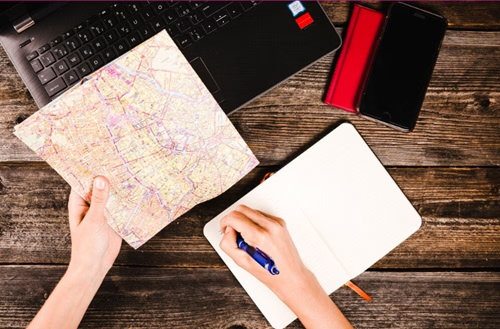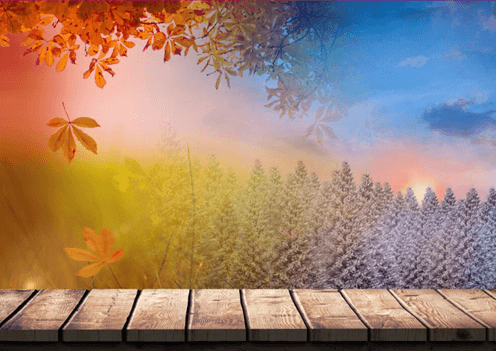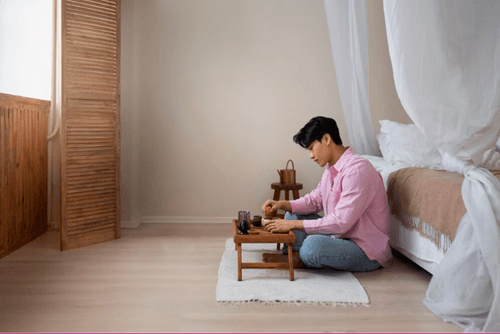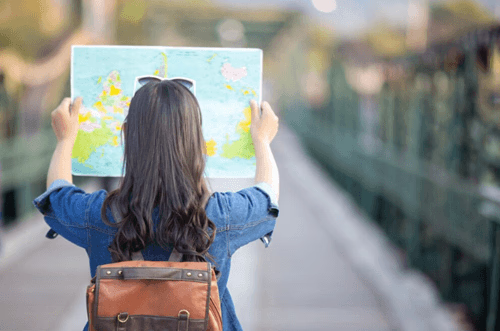
Planning a trip to Bhutan, the Land of the Thunder Dragon, is an exciting adventure that promises unforgettable experiences amidst breathtaking landscapes and rich cultural heritage.
As one of the most exclusive travel destinations in the world, Bhutan offers a unique blend of spirituality, tradition, and natural beauty.
However, navigating the logistics can be a bit overwhelming. Fear not! With the right preparation and a few key tips, you can ensure a smooth and enjoyable journey. We present tips to help you plan the perfect trip to Bhutan, from securing your visa to packing for your adventure.
1. Take note of peak & non-peak periods
The peak tourist seasons in Bhutan are from March to May (Spring) and September to November (Fall). In particular, March, April, October and November are especially busy. If you plan a trip to Bhutan during these months, it's best to book your tour package and flight tickets at least 3 months ahead to ensure your reservation.
Back in 2010, Drukair tickets were sold out for 3 consecutive weeks, so to avoid disappointment, we'd advise you to plan ahead. More tourists tend to travel during this period as they are the ideal months for festivals and trekking, which are naturally big draws.
If you prefer a more tranquil experience and want to avoid the crowds, consider traveling during the non-peak periods. These off-peak seasons offer a different charm, with fewer tourists and a more relaxed atmosphere.
While the weather might be slightly less predictable, you can still enjoy Bhutan's stunning landscapes, cultural heritage, and warm hospitality without the hustle and bustle of peak tourist traffic.
Traveling during the non-peak period can also offer cost benefits, as some tour operators may provide discounts or special packages during these times. Whether you choose to visit during the lively peak season or the serene non-peak period, planning ahead is key to making the most of your Bhutan adventure.
2. Weigh The Difference Between Peak & Non-peak Periods

Although Bhutan has away with the minimum daily rate policy (MDRP) from September 2022, with the introduction of the new Bhutan Tourism Act 2022, there is still a cost difference for accommodation between peak and non-peak periods.
During peak seasons, which span from March to May and September to November, accommodation prices can be as much as 50% higher compared to non-peak seasons.
The increase is driven by the higher demand for hotel rooms and other services, as more tourists flock to Bhutan to enjoy the favorable weather and partake in cultural festivals and trekking activities.
For instance, a 3-star hotel room that might cost USD 200 per night during the peak season could drop to around USD 100-150 during the non-peak periods which can significantly impact the overall cost of your trip, especially if you're planning an extended stay.
Choosing to travel during the non-peak periods, typically the winter months (December to February) and the monsoon season (June to August), can offer considerable savings on accommodation and sometimes on flights as well.
Besides the cost benefits, traveling during these times allows for a more relaxed experience, with fewer tourists at popular sites, giving you a more intimate encounter with Bhutan's natural beauty and cultural heritage.
However, it's important to consider the trade-offs. The non-peak periods may come with less predictable weather conditions, such as colder temperatures in winter or heavier rains during the monsoon. Despite this, the off-season can still be enjoyable with proper preparation and flexible plans.
3. Surcharge For Groups Of 2 Travelers Or Less
Travelers intending to go alone or as a pair should note the price difference for singles or couples since most of Bhutan tours are private tours and a single traveller will still be assigned one licensed tour guide, a car and a driver. In most countries this is termed as FIT (Free Independent Traveler) or single surcharge.
For single travelers, the surcharge can be quite significant. This is because the cost of the guide, vehicle, and driver are fixed and need to be covered by just one person.
Similarly, for couples, while the costs are shared, the per-person expense remains higher compared to traveling in a larger group where these fixed costs are divided among more individuals.
4. Have An Itinerary For Your First Trip To Bhutan
The most popular itinerary for first time visitors to Bhutan is our 7-days Essential Bhutan. This private tour gives first time visitors the opportunity to visit the important sites in Bhutan and experience the warm hospitality afforded by the Bhutanese. Besides visiting sights like Tiger’s nest, Punakha Dzong, Chimi Lhakhang and Thimphu, visitors can also customize their trip to include Gangtey or a trek to Bumdra.
Choosing a structured itinerary for your first trip to Bhutan ensures you make the most of your time in this enchanting country.
It helps you visit the most significant and iconic sites, guaranteeing you don’t miss any key attractions. With pre-arranged transportation, accommodation, and guided tours, your travel experience becomes seamless and hassle-free.
Moreover, a structured itinerary offers flexibility to customize your journey with activities and destinations that match your interests, such as trekking or attending cultural festivals.
It also facilitates deep cultural immersion for a profound understanding of Bhutanese culture, history, and spirituality through well-planned visits and interactions.
5. Know The Seasons

It really depends on what you want to see and do. If you want to trek, April, May, September and October are generally the best time to visit Bhutan. Although it is colder, the skies are generally clear and blue, and most importantly, it won't be muddy. Do note that the monsoon season in Bhutan is from Mid Jun - Mid Sep and during this time, light rain (1-2 hours) in the morning is typical. Heavy downpours are rare, but we generally do not recommend trekking, unless they are short day hikes.
Winter is a good time to catch the endangered black necked crane in their winter home, the Phobjika valley. Summer is a wonderful time for mushroom picking (there's even a Matsutake Mushroom Festival) and to catch glimpses of (sometimes double) rainbows over the valleys. If you're there to seek solace or for spirituality reasons, anytime would be a good time to go.
6. Plan A Trip To Bhutan During A Bhutanese Festival
There are numerous festivals occurring throughout the year in Bhutan, though the popular ones such as the Paro and Thimphu Tshechu happen during the high tourist season. Festivals in Bhutan usually showcase colourful dances in elaborate costumes, with Bhutanese in attendance dressed to their best and unsurprisingly, tend to be huge tourist draws.
Apart from religious festivals, there are a range of other festivals catering to other interests, such as the Punakha Festival, Black Necked Crane Festival, Royal Highlander Festival, Ura Matsusake Mushroom Festival and Haa Spring Festival, to name a few. If you're looking for a more intimate experience, consider going for a lesser known festival. Festivals tend to provide better photo taking opportunities.
The Dochula Pass Festival, also offers a great chance to witness some of the royal family of Bhutan. You may want to check our Bhutan Festival Calendar for more insight.
7. Consider A Home Stay

To be frank, this suggestion is often met with mixed response. Given the amount of money spent on the trip, many travellers want to unwind in the comfort of a hotel room. Others however, love the authenticity of staying with a local family and having the firsthand experience of what daily life is to a Bhutanese.
Some things to take note of if you're seriously considering this option: while some families have modern facilities, not all families have electricity or a hot shower - they may have to boil the water using firewood. What they lack in facilities however, they'll more than make up for with unparalleled hospitality.
Staying with a local family allows you to immerse yourself in the culture and traditions of the destination. You get a firsthand look at daily life, customs, and practices, providing a deeper understanding and appreciation of the local culture.
8. End It In Luxury
In Bhutan, much of your time will be spent in the car traveling from valley to valley and destination to destination. After driving through this beautiful country and possibly experiencing a homestay with a local family, consider ending your trip with a pampering, stay in a 5-star accommodation such as Uma Paro with their complimentary yoga sessions overlooking the charming Paro valley. Choose from their range of other holistic wellness programmes such as guided meditation, ayurvedic therapies or pampering massages.
Luxury hotels include:
Uma Paro
Taj Tashi
Terma Linca
Amankora
Le Meridien
Six Senses
Bonus Bhutan Travel Tips For Our Readers

-
Most hotels have WiFi, but if you need more connectivity you can get a local SIM card from Tashi Cell or B-Mobile and top up with prepaid cards. Get a Bhutan Sim card before you depart for Bhutan.
-
The official language of Bhutan is Dzongkha, but most Bhutanese are fluent in English as that is the medium of education so communication shouldn't be a problem.
-
The local currency is the Ngultrum, which is pegged to the Indian Rupee. Note: The Indian Rupee in denominations of 500 and 1000 are no longer accepted in Bhutan.
-
For money for exchange to Ngultrum (BTN) - Do note that Bhutan only accepts 10 major foreign currencies: 10 major currencies: U.S. Dollar, Pound Sterling, Euro, Japanese Yen, Swiss Franc, Hong Kong Dollar, Canadian Dollar, Danish Kroner, Australian Dollar and Singapore Dollars.
-
As the tour packages are prepaid, you'll only need money for your own personal expenses - souvenirs, tips (for driver & guide) and drinks. We normally recommend travellers bring about US$200
-
There are ATMs in Bhutan, they do not work for international cards. It is recommended that you bring some cash which you can exchange at the FX counter at Paro Airport on arrival.
-
Credit Cards are only accepted at the international hotel chains like Uma Paro, Six Senses Lodges in Bhutan, Amankora Lodges and Le Meridien Hotels.
-
Previously banned in Bhutan in 2010, selling and buying of tobacco products are no longer illegal in Bhutan.
Although it is now legal to import and sell tobacco products, lighting up in public is still a no no at the moment. Lighting up should be discrete, and when at F&B outlets only at designated areas/rooms.
-
Do pack warm clothes, especially if you're traveling between the months of November and March. As a general tip, it would be wise to always have a jacket when traveling in Bhutan regardless of the seasons as you will experience huge changes in elevation, with certain valleys colder than others. It's best to be prepared!
-
Prepare some of your own entertainment for the flight as well as trip. Bring some books to read and save movies to watch on your laptop or tablet. Apart from Thimphu and Paro, nightlife is non-existent and most hotels tend to be a distance away from the main town.
-
Want to listen to music? The best radio stations for Western songs are 92, 965 and 99.9 FM. You can also enjoy the local music on other local stations on the radio.
-
You can haggle in most shops but don't expect more than a 10% discount. Generally speaking, prices between shops don't differ substantially.
-
You don't have to tip in restaurants and hotels, unlike Western countries. The guide will take care of tipping on your behalf. However, you are encouraged to tip your guide if you wish to do so.
-
The roads tend to be windy so if you are prone to motion sickness, bring Dramamine or other medication to prevent nausea as you will be spending a lot of time in the car traveling around Bhutan.
-
Bring along a multi-purpose electrical plug and a universal travel adapter. Most hotel rooms have limited electrical plugs, so it'll be wise to take along if you have many devices.
-
When taking photos/filming inside Dzongs, monasteries, temples, or any religious institutions, check with your guide whether it is permitted as some areas do not allow it.
-
Lastly, Check out our DOs and DON'Ts in Bhutan
Conclusion About Bhutan Travel Trips
Planning a trip to Bhutan is made simple with our Bhutan travel packages. Determine the best time to travel to Bhutan and calculate your budget with our Bhutan travel cost guide. Indulge in luxury travel in Bhutan for a premium experience. If you're travelling from Malaysia, our travel to Bhutan from Malaysia guide will be useful. For comprehensive planning, trust the best Bhutan travel company. Druk Asia ensures your Bhutan trip is perfectly planned."
Frequently Asked Questions About Bhutan Travel Trips
Are There Any Specific Customs Or Taboos I Should Be Aware Of?
Yes, there are several customs and taboos to be mindful of in Bhutan.
For example, avoid pointing at people or religious objects with your index finger, refrain from touching anyone on the head, and always remove your shoes before entering temples and homes. Also, dress modestly and show respect to monks and elders.
Can I Use My Mobile Phone And Access The Internet In Bhutan?
Mobile phone coverage is available in most urban areas, but it can be limited in remote regions. You can purchase a local SIM card from Bhutan Telecom or TashiCell for better connectivity.
Internet access is available in most hotels and cafes, though the speed may vary. It's advisable to inform your tour operator about your communication needs beforehand.
What Are The Accommodation Options Like In Bhutan?
Bhutan offers a range of accommodation options, from budget guesthouses and homestays to luxury hotels and resorts.
Most tour packages include stays in 3-star hotels, but you can upgrade to 4 or 5-star accommodations for an additional cost. Homestays provide a more authentic cultural experience, while luxury resorts offer top-notch amenities and services.
Is Tipping Expected In Bhutan?
Tipping is not a traditional practice in Bhutan, but it is becoming more common, especially in the tourism industry. While it is not obligatory, tipping is appreciated for good service. You can tip guides, drivers, and hotel staff if you feel they have provided excellent service.
The amount is at your discretion, but a general guideline is to tip guides around USD 10-15 per day and drivers around USD 5-10 per day.
